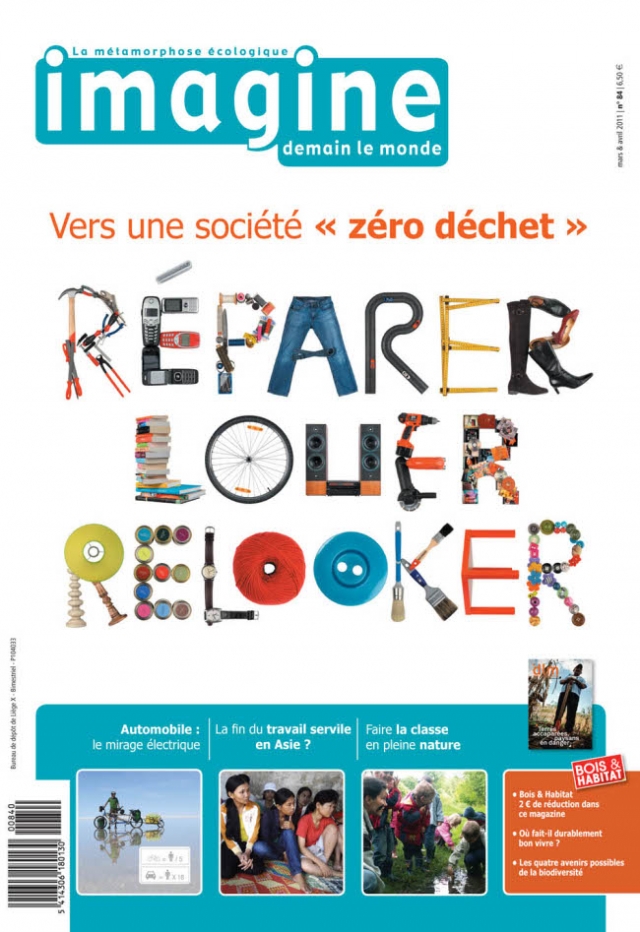Trash can, my beautiful ...
Waste, we all have full bags at home ... We sort it out gladly, then put it on the sidewalk or in a recycling center, without thinking much about it. However, behind this innocuous trash, hides a whole universe! We can see it as a reflection of our life, our mode of consumption, our beliefs sometimes. There are gigantic resources, often valuable, potentially huge reductions in CO2. Our economy, our public management are hidden there… Imagine invites you for a quick tour of the owner. Just to look at your trash tomorrow with a different eye.
How to produce while limiting waste?
One solution, prevention!
The best waste is that which does not exist. Obvious, but which goes against our consumer society. What if we changed?
Half a ton. That's about what weighs the annual trash of the average European ... Difficult not to find this absurd! Because this half-ton, it will of course have to be treated, at worst to bury or burn it (and pollute the soil and air), at best to recycle it (at the cost of a new energy consumption). This huge trash can certainly not get heavier since the 2000s, a sign of a slight stall between economic growth and waste production, but it does not lighten either [1].
The first battle to be waged is obvious: we must reduce our production of waste as much as possible. Especially since, behind this trash, hides a mountain of resources: 60 kg to produce the equivalent of a shopping cart of 7 kg of various foodstuffs [2]. Each of the products we use thus generates an “ecological backpack”: that of a kilo of copper will be 15 kg, while that of a 2,8 kg laptop will weigh 434 kg [3] ...
(...)
A “minimum waste” day
Reducing the production of waste is great that we can act on a daily basis! A multitude of gestures, sometimes very simple, are within our reach… Some examples over the course of a typical day - and ideal!
7:00 The alarm rings
It is connected to the mains, to avoid the consumption of batteries, and I have had it for many years. As long as it fulfills its role, I keep it, no need to buy a state-of-the-art model. When it has really become unusable, I will take it to a container park, for recycling.
(...)
Progress in waste management policy
From landfill to recycling
Until the quantity of our waste decreases and its quality increases, we must treat - and treat well - those that we still produce abundantly today. the options chosen are gradually moving towards improvement.
Between landfill, incinerator, recycling or reuse, the range of possible solutions is wide, and the priorities have fortunately evolved, the obligation to apply the European hierarchy (prevention, preparation for reuse, recycling, other recovery, disposal) bearing gradually its fruits.
(...)
Unwrapping packaging
Symbols of our consumer society, packaging, if it becomes lighter, is always more numerous. Stop there?
(...)
Bulky items, electrical and electronic devices
The "second hand": a way of reaching out ...
What do we do with our old furniture and computers? It is unclear !
Beyond the trash bags, we also throw a quantity of other things: old fridges, rickety tables, mobile phones or electrical or electronic devices of all kinds ... Objects whose manufacture often required a lot of energy and work, objects whose components are sometimes dangerous too. Preventing them from disappearing in a landfill or incinerator is obviously essential.
In the case of WEEE (waste electrical and electronic equipment), a take-back obligation has been introduced. You have certainly already seen the mention "Recupel" at the bottom of an invoice, when buying a washing machine or a computer.
(...)
Recycling
From waste to "secondary material"
Recycling is now recognized as necessary and essential. It is now a sector where innovations flourish, to dig even deeper into our personal deposits - those of consumption and production waste.
(...)
organic
Chic waste
Almost half of our trash is made up of organic waste. Let's get them out of there!
It is obvious that more and more of us and more and more intermunicipal companies are going, fortunately: burning vegetable, fruit or garden clippings is absurd. Especially when we know that this material can provide us with compost or energy ... Several formulas are possible. The simplest is that of home composting: very inexpensive, it falls under prevention since this organic matter will not even have to be taken care of by the community.
(...)
Better use of industrial waste
How to better recover and recover industrial waste, currently managed by market laws and regulations? Progress is possible, as the construction sector shows.
(...)
Read this file (16 pages) in the paper magazine available from your bookstore. You can also order it by email (we will send it to you by post, see price list here) or buy it in PDF format (3 euros).
[1] With the exception of the drop due to the economic crisis in 2008, where the link between economic activity and waste production worked.
[2] Friends of the Earth, Overconsumption, September 2009.
[3] Cniid report, Planned obsolescence, September 2010.
Source: http://www.imagine-magazine.com/lire/sp ... rticle1300
Read also:
- (Hot) debate on industrial obsolescence
- Forum repair to throw away less
And 2 debates on repair (when it is still possible):
- https://www.econologie.com/forums/remplacer- ... 10308.html
- https://www.econologie.com/forums/ifixit-tu- ... 10168.html


